(srpski) ”Pamtimo sve žrtve” – Predstavljeni rezultati istraživanja za Sisačko-moslavačku županiju
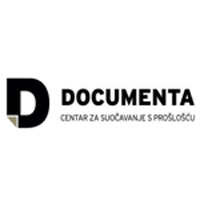
Sorry, this entry is only available in srpski.


Sorry, this entry is only available in srpski.
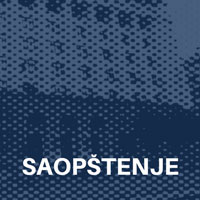
 On 30 October 2023, the Court of Appeal in Belgrade issued a decision[1] annulling the first-instance verdict in the Štrpci Case and returning the case for retrial. The Humanitarian Law Center considers it inadmissible that thirty years after the abduction and murder of twenty civilians in Štrpci, the judicial authorities are unable to conduct the procedure in a professional manner and reach a verdict.
On 30 October 2023, the Court of Appeal in Belgrade issued a decision[1] annulling the first-instance verdict in the Štrpci Case and returning the case for retrial. The Humanitarian Law Center considers it inadmissible that thirty years after the abduction and murder of twenty civilians in Štrpci, the judicial authorities are unable to conduct the procedure in a professional manner and reach a verdict.
Initiating the proceedings again implies the re-traumatisation and exhaustion of the families of the victims and witnesses in this proceeding, as well as the trivialisation of war crimes trials. Such a decision not only delays the imprisonment of the direct perpetrators, one of whom has already died during the proceedings, but also the hope that representatives of the civil, military and police authorities of Serbia and of the Federal Republic of Yugoslavia who were familiar with the kidnapping plan in Štrpci, will be prosecuted for the crime. This procedure has not contributed to the discovery of the mortal remains of the victims, which is one of the goals of the National Strategy for the War Crimes Prosecution.
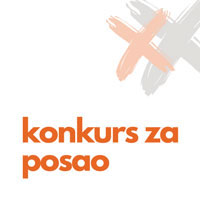
 Location: Belgrade, Serbia
Location: Belgrade, Serbia
Full-time, office-based
Deadline: December 17, 2023
The Humanitarian Law Center is the leading non-governmental organisation in Serbia dealing with the legacies of the wars in the former Yugoslavia during the 1990s. Its work is founded on three closely interrelated pillars: documentation, justice, and memory. The Memory Programme relies on the documentation gathered by the HLC during the 30 years of its work, including the facts established before courts, in order to commemorate victims of war crimes, challenge the dominant revisionist narratives about the wars, provide informal education on the subject, and disseminate the judicially determined facts about the wars in an arresting way, using different media formats.
We are looking for a dedicated and skillful professional to add their expertise and strengthen our team of experienced researchers and practitioners. The Project Coordinator will be responsible for further developing our programme and implementing, monitoring, and reporting on the implementation of activities. She or he will coordinate the 3-4 member team’s work and report directly to the Deputy Executive Director.
Duties:
To perform the mentioned tasks, the candidate must meet the following requirements:
Preference will be given to candidates:
The engagement requires full-time commitment and office-based work in Belgrade.
Applications should include a curriculum vitae (CV), and a motivational letter with information on the reasons for applying to the job opening and the key areas of potential contribution to the HLC’s Memory Programme. Please send applications to konkurs@hlc-rdc.org by December 17, 2023, at the latest. After reviewing applications, only shortlisted candidates will be contacted.
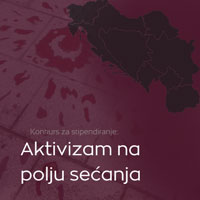
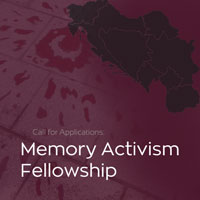
The Humanitarian Law Center (HLC) has announced a new call for a fellowship within the “Memory Activism” program. The objective of the program is to facilitate a critical, facts-based, and victim-centered memory culture related to the wars in the former Yugoslavia.
We offer fellowships for a duration of 3 to 6 months, commencing from February until the end of September 2024. We invite fellowship applications from researchers, journalists, practitioners, and artists who focus on the 1990s wars in the former Yugoslavia from various perspectives. The fellowship is non-residential and does not require physical presence in Belgrade. Fellows are expected to produce outputs during the fellowship, which will be published and promoted by the HLC. Outputs can take the form of analyses, policy papers, reports, a series of blogs, or the organization of events and can be in electronic/digital and physical forms. Fellowships can start from February 1, 2024, and must conclude no later than September 30, 2024.
Candidates over 18 years of age, regardless of nationality and residence, are eligible to apply. Applications can be individual or group-based, with a maximum of three members per group. In the case of a group application, the scholarship amount will be divided among the number of group members. The scholarship includes a monthly gross honorarium of USD 1,563, aimed at supporting fellows during the research period and the implementation of planned activities.
Applications for the scholarship should include:
Applications should be sent to the email address memoryprogram@hlc-rdc.org with the subject “Application for Fellowship 2023,” no later than December 31, 2023. Applications can be in English or BCMS language. Applicants will be notified of the success of their application during the last week of January.
Selection criteria include:
Since 1992, the Humanitarian Law Center has been documenting war crimes and human rights violations in the former Yugoslavia, focusing on victims and their testimonies. Advocating for comprehensive work in the transitional justice process has been central to the organization’s mission. The work of the organization is based on three pillars: documentation, justice, and memory, with the “Memory Activism” program being crucial for the organization’s future. Within this program, the HLC commemorates and remembers the victims of conflicts through various initiatives, including public debates, documentaries, digital activism on social media, and other digital memory practices. In addition to paying tribute to the victims of war crimes and mass human rights violations during the 1990s wars, the “Memory Activism” program examines and criticizes dominant revisionist narratives about the wars, provides informal education, promotes legally established facts about the wars in an engaging manner, using various media formats. The program also conducts research, analysis, and policy proposals focused on memory policies in the region.
Any questions about the fellowship and its conditions can be sent to memoryprogram@hlc-rdc.org or nikola.gajic@hlc-rdc.org.

Sorry, this entry is only available in srpski.
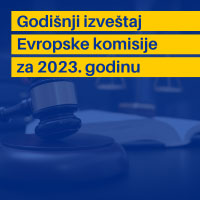
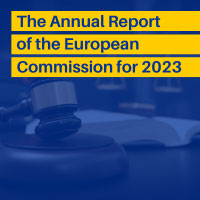 On November 8th, 2023, the European Commission (EC) adopted an annual report assessing the situation and progress of the Republic of Serbia on its path to accession to the European Union.
On November 8th, 2023, the European Commission (EC) adopted an annual report assessing the situation and progress of the Republic of Serbia on its path to accession to the European Union.
Under Chapter 23 concerning the judiciary and fundamental rights, the EC report includes an assessment of the work of relevant state institutions regarding war crimes trials in Serbia, particularly the Public Prosecutor’s Office for War Crimes (PPOWC), their cooperation with regional and international actors, as well as the efficiency and dedication to criminal justice processes.
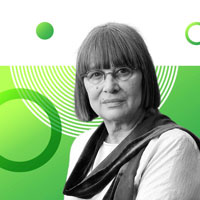
 Among them, in the Politics & Advocacy category, are Rukshana Kapali, Nepal, Sonia Guajajara, Brazil, Monica McWilliams, UK, Summia Tora, Afghanistan, Sepideh Rashnu, Iran, Neema Namadamu, Democratic Republic of Congo, Bella Galhos, East Timor,Rina Gonoi, Japan, Maryam Al-Khawaja, Bahrain/Denmark, Christiana Figueres, Costa Rica, Tamar Museridze, Georgia, Iryna Stavchuk, Ukraine, Nataša Kandić, Serbia, Yael Braudo-Bahat, Israel, Michelle Obama, US, Shamsa Araweelo, Somalia/UK, Bernadette Smith, Turtle Island / Canada, Renita Holmes, US, Dehenna Davison, UK, Yasmina Benslimane, Morocco, Xu Zaozao, China, Alicia Cahuiya, Ecuador, Najla Mohamed-Lamin, Western Sahara, Sofia Kosacheva, Russia, Ulanda Mtamba, Malawi, Amal Clooney, UK/Lebanon and Gloria Steinem, US.
Among them, in the Politics & Advocacy category, are Rukshana Kapali, Nepal, Sonia Guajajara, Brazil, Monica McWilliams, UK, Summia Tora, Afghanistan, Sepideh Rashnu, Iran, Neema Namadamu, Democratic Republic of Congo, Bella Galhos, East Timor,Rina Gonoi, Japan, Maryam Al-Khawaja, Bahrain/Denmark, Christiana Figueres, Costa Rica, Tamar Museridze, Georgia, Iryna Stavchuk, Ukraine, Nataša Kandić, Serbia, Yael Braudo-Bahat, Israel, Michelle Obama, US, Shamsa Araweelo, Somalia/UK, Bernadette Smith, Turtle Island / Canada, Renita Holmes, US, Dehenna Davison, UK, Yasmina Benslimane, Morocco, Xu Zaozao, China, Alicia Cahuiya, Ecuador, Najla Mohamed-Lamin, Western Sahara, Sofia Kosacheva, Russia, Ulanda Mtamba, Malawi, Amal Clooney, UK/Lebanon and Gloria Steinem, US.
https://www.bbc.co.uk/news/resources/idt-02d9060e-15dc-426c-bfe0-86a6437e5234
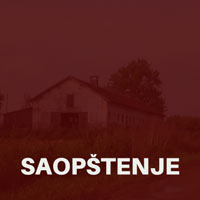
 On the occasion of the 32nd anniversary of the crime at the farm at Ovčara near Vukovar, the Humanitarian Law Center (HLC) requests the institutions of Serbia to prosecute the officers of the former JNA who directly contributed to the commission of that crime, to give up supporting war criminals, to bring to a satisfactory conclusion the years-long search for the mortal remains of victims, and to help enable the creation of a memory culture dignifying victims.
On the occasion of the 32nd anniversary of the crime at the farm at Ovčara near Vukovar, the Humanitarian Law Center (HLC) requests the institutions of Serbia to prosecute the officers of the former JNA who directly contributed to the commission of that crime, to give up supporting war criminals, to bring to a satisfactory conclusion the years-long search for the mortal remains of victims, and to help enable the creation of a memory culture dignifying victims.
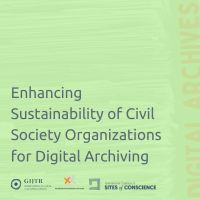
 The Humanitarian Law Center in cooperation with the Global Initiative for Justice, Truth and Reconciliation consortium is organizing a three-day international conference titled “Enhancing Sustainability of Civil Society Organizations for Digital Archiving”. The aim of this event is to support civil society organizations from around the world in developing their digital archives dedicated to systematic and mass violations of human rights.
The Humanitarian Law Center in cooperation with the Global Initiative for Justice, Truth and Reconciliation consortium is organizing a three-day international conference titled “Enhancing Sustainability of Civil Society Organizations for Digital Archiving”. The aim of this event is to support civil society organizations from around the world in developing their digital archives dedicated to systematic and mass violations of human rights.
The conference will be held from November 1st to 3rd, 2023, in Belgrade, with the participation of experts and representatives of organizations documenting human rights violations from more than 15 countries, including Argentina, Ukraine, Indonesia, Spain, Croatia, Sri Lanka and others. The diversity of participants and the social and political contexts in which these organizations engage in documenting and digital archiving of human rights violations will provide a variety of perspectives and enrich the discussions.
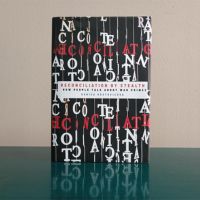
 Book review: Denisa Kostovicova, Reconciliation by Stealth: How People Talkabout War Crimes, Cornell University Press, 2023.
Book review: Denisa Kostovicova, Reconciliation by Stealth: How People Talkabout War Crimes, Cornell University Press, 2023.
Jasna Dragović – Soso
When it comes to the post-conflict Balkans, publications in the field of Transitional Justice are numerous. The region has been, as Eric Gordy and I noted more than 10 years ago, a veritable ‘laboratory of transitional justice initiatives’, although I think it would be fair to say most of the public attention has been focused on the International Criminal Tribunal for the former Yugoslavia. In this context, it is worth noting that, over the last couple of decades, there have also been several truth commission initiatives, at the national and local levels, and above all, there was a regional initiative undertaken by the Coalition for RECOM, as this network of over 2,000 civil society organisations and individuals is known. Of all these various initiatives, RECOM has by far been the most original and also the most sustained project—spanning over a decade, and including, as Reconciliation by Stealth notes, years of consultations with various stakeholders across the region. It has thus attracted a fair amount of interest and scholarship, generating differing assessments of the project’s process and impact. Where does Kostovicova’s book sit within this literature?